Sample Daily Checklists for Powered Industrial Trucks
The following checklists are intended to assist in providing training on OSHA's powered industrial truck operator standards. They are not a substitute for any of the provisions of the Occupational Safety and Health Act of 1970 or for any standards issued by the U.S. Department of Labor's Occupational Safety and Health Administration (OSHA). OSHA wishes to acknowledge that this checklist and related graphics was developed in cooperation with the Industrial Truck Association as part of the OSHA-ITA Alliance.
The OSHA standard for powered industrial truck training [29 CFR 1910.178(l)] requires that an employer provide training to truck operators on a variety of topics. Among these topics are vehicle inspection and maintenance that the operator will be required to perform. The following checklists are being provided as part of OSHA's ongoing effort to assist employers and employees in ensuring that a safe and healthful workplace is provided. The lists serve as a guide only and may not be totally inclusive. Each type of powered industrial truck is unique and checklists pertinent to each type of vehicle should be modified accordingly. It is recommended that the manufacturer's instructions on vehicle maintenance and owner's and operator's responsibilities also be consulted. The OSHA standards for powered industrial trucks must be reviewed to ensure compliance.
There are two general types of powered industrial trucks: electric (battery) powered and internal combustion engine (gas/LPG/diesel) powered. Each of these general types has a variety of different configurations and attachments. Your workplace may have a variety of trucks that are being operated. ALL OPERATORS MUST BE TRAINED TO OPERATE ALL TYPE OF INDUSTRIAL TRUCKS THEY WILL BE OPERATING.
Daily, pre-shift inspection of powered industrial trucks is required by OSHA standards.
Depicted below are the major types of industrial trucks and some of the most common variations. The drawings of the trucks depicted below are intended to represent the typical configuration of trucks for each type. They do not include all available options, attachments or configurations.
Electric Motor Powered Industrial Trucks
 Standup End Control Rider |
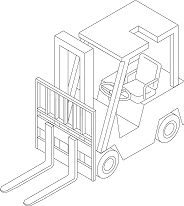 Sitdown Rider |
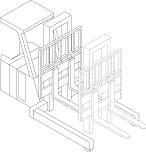 Narrow Aisle Reach |
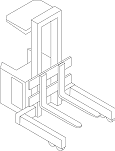 Narrow Aisle High Lift Straddle |
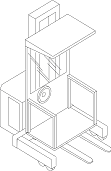 Narrow Aisle Order Picker |
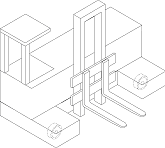 Narrow Aisle Sideloader Platform |
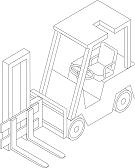 Narrow Aisle Sideloader High Lift Pallet |
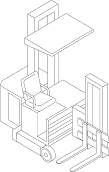 Narrow Aisle Turret |
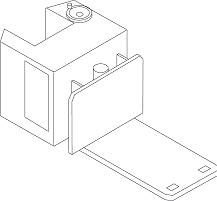 Narrow Aisle Low Lift Platform |
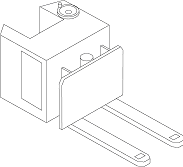 Stacker Pallet |
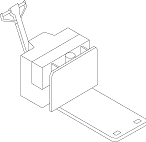 Walkie Platform Low Lift |
 Walkie Pallet Low Lift |
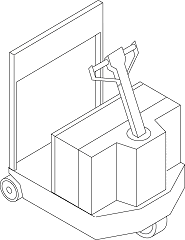 Tractor Walkie/Rider |
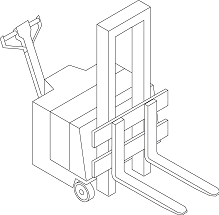 Walkie Pallet High Lift |
Internal Combustion Engine Powered Industrial Trucks - Gas/LPG/Diesel
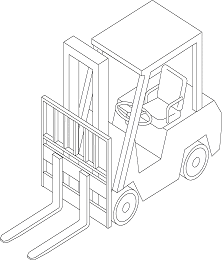 Counterbalanced Forklift Gas/LPG Cushion Tire |
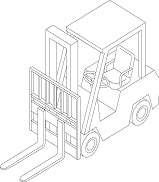 Counterbalanced Forklift Gas/LPG/Diesel Pneumatic Tire |
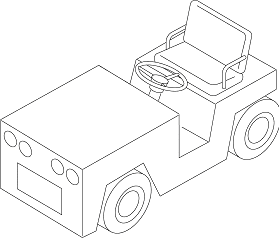 Tow Tractor Gas/LPG/Diesel |
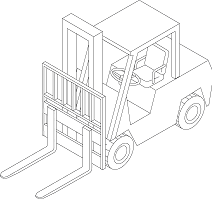 Rough Terrain Forklift Gas/LPG/Diesel Vertical Mast |
Daily checklists for each type of industrial truck are available from the truck manufacturer. You may choose to use a checklist for each type of industrial truck in your workplace or compile one that can be used for any type of truck.
Refer to the owner's manual, specifications and manufacturer's recommendations to modify the checklist for trucks being operated in your workplace. Below are sample checklists for internal combustion and electric trucks. These lists can be modified to suit your workplace needs.
Operator's Daily Checklist - Internal Combustion Engine Industrial Truck - Gas/LPG/Diesel Truck
Record of Fuel Added
| Date | Operator | Fuel | |||
| Truck# | Model# | Engine Oil | |||
| Department | Serial# | Radiator Coolant | |||
| Shift | Hour Meter | Hydraulic Oil |
SAFETY AND OPERATIONAL CHECKS (PRIOR TO EACH SHIFT)
Have a qualified mechanic correct all problems.
| Engine Off Checks | OK | Maintenance |
| Leaks – Fuel, Hydraulic Oil, Engine Oil or Radiator Coolant | ||
| Tires – Condition and Pressure | ||
| Forks, Top Clip Retaining Pin and Heel – Check Condition | ||
| Load Backrest – Securely Attached | ||
| Hydraulic Hoses, Mast Chains, Cables and Stops – Check Visually | ||
| Overhead Guard – Attached | ||
| Finger Guards – Attached | ||
| Propane Tank (LP Gas Truck) – Rust Corrosion, Damage | ||
| Safety Warnings – Attached (Refer to Parts Manual for Location) | ||
| Battery – Check Water/Electrolyte Level and Charge | ||
| All Engine Belts – Check Visually | ||
| Hydraulic Fluid Level – Check Level | ||
| Engine Oil Level – Dipstick | ||
| Transmission Fluid Level – Dipstick | ||
| Engine Air Cleaner – Squeeze Rubber Dirt Trap or Check the Restriction Alarm (if equipped) | ||
| Fuel Sedimentor (Diesel) | ||
| Radiator Coolant – Check Level | ||
| Operator's Manual – In Container | ||
| Nameplate – Attached and Information Matches Model, Serial Number and Attachments | ||
| Seat Belt – Functioning Smoothly | ||
| Hood Latch – Adjusted and Securely Fastened | ||
| Brake Fluid – Check Level | ||
| Engine On Checks – Unusual Noises Must Be Investigated Immediately | OK | Maintenance |
| Accelerator or Direction Control Pedal – Functioning Smoothly | ||
| Service Brake – Functioning Smoothly | ||
| Parking Brake – Functioning Smoothly | ||
| Steering Operation – Functioning Smoothly | ||
| Drive Control – Forward/Reverse – Functioning Smoothly | ||
| Tilt Control – Forward and Back – Functioning Smoothly | ||
| Hoist and Lowering Control – Functioning Smoothly | ||
| Attachment Control – Operation | ||
| Horn and Lights – Functioning | ||
| Cab (if equipped) – Heater, Defroster, Wipers – Functioning | ||
| Gauges: Ammeter, Engine Oil Pressure, Hour Meter, Fuel Level, Temperature, Instrument Monitors – Functioning |
Operator's Daily Checklist - Electric Industrial Truck
Record of Fluid Added
| Date | Operator | Battery Water | |||
| Truck# | Model# | Hydraulic Oil | |||
| Department | Serial# | ||||
| Shift | Drive Hour Meter Reading | Hoist Hour Meter Reading |
SAFETY AND OPERATIONAL CHECKS (PRIOR TO EACH SHIFT)
Have a qualified mechanic correct all problems.
| Motor Off Checks | OK | Maintenance |
| Leaks – Hydraulic Oil, Battery | ||
| Tires – Condition and Pressure | ||
| Forks, Top Clip Retaining Pin and Heel -- Condition | ||
| Load Backrest Extension – Attached | ||
| Hydraulic Hoses, Mast Chains, Cables & Stops – Check Visually | ||
| Finger Guards – Attached | ||
| Overhead Guard – Attached | ||
| Safety Warnings – Attached (Refer to Parts Manual for Location) | ||
| Battery – Water/Electrolyte Level and Charge | ||
| Hydraulic Fluid Level – Dipstick | ||
| Transmission Fluid Level – Dipstick | ||
| Operator's Manual in Container | ||
| Capacity Plate Attached – Information Matches Model, Serial Number and Attachments | ||
| Battery Restraint System – Adjust and Fasten | ||
| Operator Protection Sitdown Truck - Seat Belt – Functioning Smoothly Man-up Truck – Fall protection/Restraining means - Functioning |
||
| Brake Fluid – Check level | ||
| Motor On Checks (Unusual Noises Must Be Investigated Immediately) | OK | Maintenance |
| Accelerator Linkage – Functioning Smoothly | ||
| Parking Brake – Functioning Smoothly | ||
| Service Brake – Functioning Smoothly | ||
| Steering Operation – Functioning Smoothly | ||
| Drive Control – Forward/Reverse – Functioning Smoothly | ||
| Tilt Control – Forward and Back – Functioning Smoothly | ||
| Hoist and Lowering Control – Functioning Smoothly | ||
| Attachment Control – Operation | ||
| Horn – Functioning | ||
| Lights & Alarms (where present) – Functioning | ||
| Hour Meter – Functioning | ||
| Battery Discharge Indicator – Functioning | ||
| Instrument Monitors – Functioning |
ALL OPERATORS MUST BE TRAINED AND EVALUATED ON THE TYPES OF INDUSTRIAL TRUCKS AND ATTACHMENTS THEY WILL BE OPERATING.

